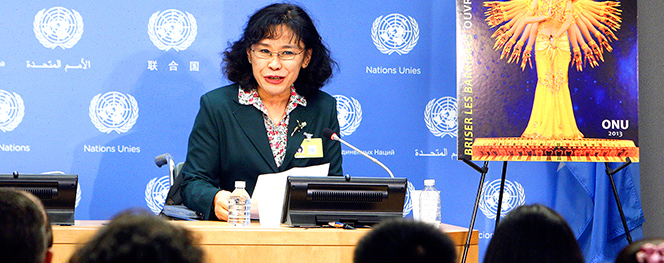About UN Women China
English |中文

Working in China since 1998, UN Women provides technical and financial assistance to innovative programmes and strategies for gender equality and women's empowerment.
UN Women works in partnership with governments, non-governmental organisations (NGOs), UN agencies, donors, communities and networks to advance gender equality.
Placing the advancement of women's human rights at the centre of our work, UN Women China focuses on:
- Violence against Women This fundamental violation of women’s rights remains widespread. Women need strong laws, backed by implementation and services for protection and prevention.
- Leadership and Political Participation Whether in political bodies or corporate boardrooms, women have a limited say in the decisions that affect them. Measures are needed to open more space for women’s participation and help women realize their full leadership potential.
- Economic Empowerment Women lag far behind men in access to land, credit and decent jobs, even though a growing body of research shows that enhancing women’s economic options boosts national economies.
- National Planning and Budgeting Public planning often overlooks women’s specific needs and priorities. Gender equality should be a stated objective of all plans, backed by specific actions for implementation and sufficient funding.
In these major focus areas, UN Women China has projects and programmes in the following areas
UN Women China's programmes are guided by:
- The Convention on the Elimination of All Forms of Discrimination against Women (CEDAW), 1979
- The Beijing Platform for Action (BPFA), 1995
- The Millennium Declaration and Development Goals (MDGs), 2005
- The Paris Declaration, 2005
China ratified CEDAW in 1980 and is legally obliged to take all appropriate measures to eliminate discrimination against women and advance gender equality. UN Women assists China to meet its obligations to implement CEDAW by strengthening the capacity of national partners. The spirit of CEDAW and BPFA has been affirmed by the Millennium Declaration and the MDGs.
UN Women China is the Secretariat for the United Nations Theme Group on Gender (UNTGG). The objective of the UNTGG is to serve as a forum and a channel for experience sharing in an effort to develop effective gender mainstreaming strategies and advocacy in the work of the UN system and the wider donor community.
The China Gender Facility (CGF) was established in 2004 by the UNTGG. Administered by UN Women, the objective of the CGF is to contribute to gender equality and women’s empowerment in China.
The CGF provides grants of approximately $50,000 to government, civil society, and academic institutions in China. These grants fund innovative proposals that support research on contemporary gender issues, as well as advocacy and dialogue leading to gender-responsive development plans, policies and programmes in China. So far the CGF has supported 44 projects addressing a wide range of gender issues, including domestic violence, gender and climate change, and women’s equal access to employment, among other issues.
Funding for the CGF is provided by UN Agencies, bilateral donors and the private sector.
CGF in Action
As a result of the CGF Project with the Southeast University for Nationalities implemented in Liangshan, Sichuan, a Yi Minority Autonomous Region, a culturally sensitive intervention model on trafficking in women and children was established between indigenous mediators and the official judicial system to jointly resolve trafficking problems in Sichuan Province.
Through the CGF project implemented by Beijing Zhongze Women’s Legal Aid Center, the North China Pharmaceutical Company has established a corporate sexual harassment prevention mechanism, and incorporated it in the company’s policy system. The mechanism defines sexual harassment, lays out the obligations of employees and the company, and establishes an internal office for handling sexual harassment complaints.